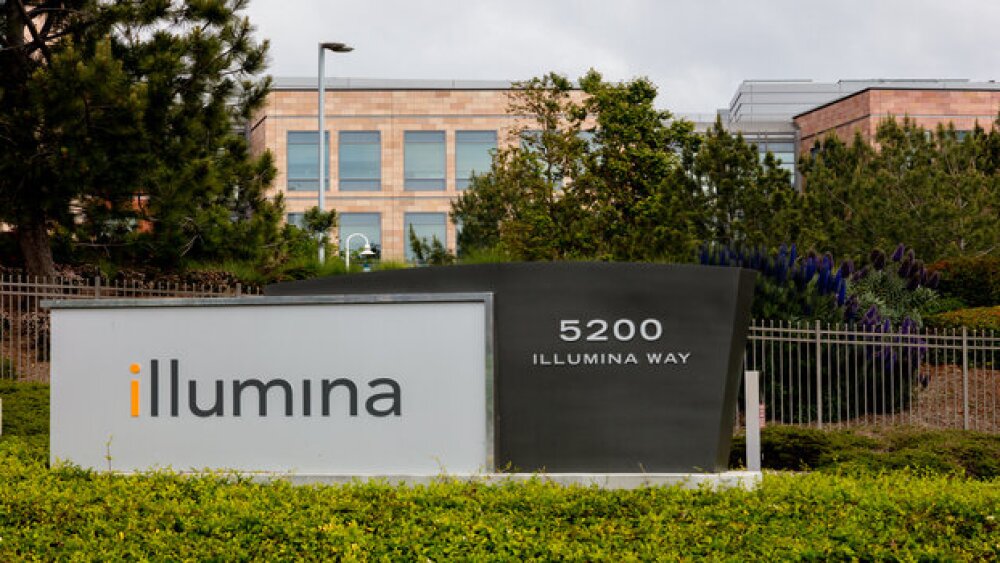The European Commission on Thursday ordered Illumina to divest Grail, opening the next chapter in the years-long regulatory saga. Illumina is reviewing the order, Reuters reported.
Pictured: Signage outside Illumina’s facility in California/iStock, Georgejason
As anticipated, the European Commission announced Thursday it would send Illumina an order to divest Grail, the cancer testing company it acquired in September 2020 for $8 billion in cash and stock.
The Commission has adopted, “under the EU Merger Regulation (‘EUMR’), restorative measures requiring Illumina to unwind its completed acquisition of GRAIL, following the Commission’s decision to prohibit the transaction,” according to a press release issued by the regulatory body.
Illumina can choose to divest Grail via a trade sale or capital markets transaction or other methods providing—among other restrictions—that the move restores GRAIL’s independence to the same level it enjoyed prior to the acquisition and “Grail must be as viable and competitive after the divestment as it was before Illumina’s acquisition.”
Illumina said it is currently reviewing the divestment order, Reuters reported.
Original article published Oct. 11
The European Union’s regulatory authorities are expected in the coming days to order Illumina to divest cancer testing biotech Grail, according to a report from Reuters citing a source familiar with the matter.
The Financial Times also wrote about the potentially impending order, noting that it could come as early as next week. Another unnamed source said that the gene sequencing giant is likely to appeal any regulatory directive to divest Grail.
Illumina acquired Grail in September 2020 for $8 billion in cash and stock. The move was quickly met with regulatory opposition due to potential anti-trust conflicts. In July 2021, the EU opened an in-depth investigation into the deal, raising concerns that the merger could “reduce competition and innovation” in the cancer detection market.
In addition, EU regulators also said that the acquisition might potentially reduce innovation in the space, limit consumer choice and pose steep barriers to competitive entry into the cancer testing space.
Despite the ongoing probe, Illumina and Grail nonetheless pushed through with the acquisition, which was closed in August 2021. Illumina acknowledged the EU’s investigation, but pointed out that the deal would have expired before the regulators would have reached a decision.
“Grail has no business in the EU, and the company believes that the European Commission does not have jurisdiction to review the merger as the EU merger thresholds are not met, nor are they met in any EU member state,” according to an Illumina announcement at the time.
In October 2021, the EU laid down temporary measures against the acquisition’s close, which it said was “in breach of the standstill obligation” under the EU’s merger rules. The interim measures sought to keep Illumina and Grail as separate entities and prevented, among others, the sharing of confidential business information between the two companies.
Ultimately, the EU ruled in September 2022 that the acquisition violated anti-trust regulations and ordered Illumina to divest Grail. In December 2022, the regulators ordered Illumina to “unwind the acquisition.”
In July 2023, the European Commission handed Illumina a record-breaking $479 million fine for pushing through with the acquisition despite the standstill obligation, a violation that it called “unprecedented and very serious infringement” of its merger regulations. Grail was also given a symbolic fine of approximately $1,100, making it the first target company to receive such a penalty.
The multibillion-dollar acquisition has also been met with strong anti-trust pushback in the U.S. In August 2023, the Securities and Exchange Commission announced that it was likewise investigating the deal.
Tristan Manalac is an independent science writer based in Metro Manila, Philippines. He can be reached at tristan@tristanmanalac.com or tristan.manalac@biospace.com.






